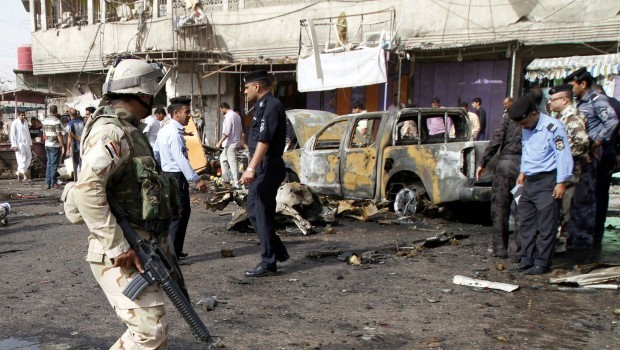
Iraqi security force members and civilians gather at the site of a car bomb attack in front of a crowded popular restaurant in Basra, 340 miles southeast of Baghdad, Iraq, on Monday, May 20, 2013. (AP Photo/ Nabil al-Jurani)
Baghdad and the predominantly Shi’ite port city of Basra in the south were the scene of the latest attacks, which killed 40 people according to official sources quoted by news agencies.
Iraqi police say that nine bombs exploded in public spaces in Shi’ite districts in Baghdad, while two car bombs exploded in Basra, at the city’s central bus station and in a restaurant.
This also followed an assault on a police station near the town of Rawah in the northwest of the country on Sunday evening, which reportedly killed 10 police officers.
The attacks follow weeks of escalating sectarian tensions across Iraq, with thousands of Iraqi Sunnis taking part in large-scale protests against the Shi’ite-led government of prime minister Nuri Al-Maliki since December.
Iraq’s Sunnis say that they are discriminated against by the authorities, and tensions have increased sharply since a raid by the security forces on a protest camp in the northern town of Hawija in April left dozens dead.
The Iraqi government denies the protesters’ claims, and has sought to defuse the tensions by releasing some Sunni prisoners and raising the salaries of Sunni defense militias, although this has not placated the protesters so far.
Although no group has claimed responsibility for the attacks, experts said they bore the hallmarks of the extremist Sunni group Al-Qaeda in Iraq, which has sought to capitalize on Iraq’s growing sectarian tensions to re-ignite the widespread sectarian bloodshed of 2006–7.
